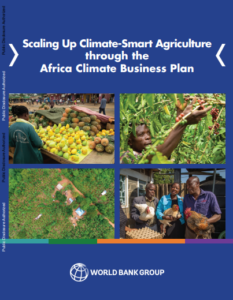
October 1, 2018 – the World Bank publishes a report on “Scaling Up Climate-Smart Agriculture through the Africa Climate Business Plan” to present how it is supporting African governments in making climate-smart agricultural practices a priority.
At the 21st Session of the Conference of the Parties (COP 21) in Paris in 2015, the World Bank launched the Africa Climate Business Plan (ACBP) to address Africa’s intricately linked climate and development agendas. The ACBP calls for US$19 billion in funding to help Africa adapt to climate change and build up the continent’s resilience to climate shocks, with the main focus on CSA strategies.
From January 2016 to April 2018, the World Bank’s Board of Directors approved 83 projects supporting climate-smart agriculture in Africa with cumulative investments of US$3.8 billion. Spreading across 30 countries, the projects aim to improve the livelihoods of about 5 million farmers and increase the climate resilience and productivity of about 3 million hectares of land.
This report reviews the Africa Climate Business Plan (ACBP) portfolio and finds that it is heavily supporting African countries to adopt and improve on a range of context-specific climate-smart technologies and practices to meet their food security and climate change goals.
CSA practices improving livestock production are the most prevalent practice in the climate-smart agriculture portfolio, followed by improved water management, conservation agriculture, agroforestry, and, notably, digital agriculture. Why digital? The application of digital technology in the design and delivery of integrated weather and market advisories using big data analytics is increasingly helping countries to identify conditions that may endanger food security and inform farmers’ decisions to adequately respond to, and when possible, capitalize on the changing conditions.
This report also highlights the need to urgently step up knowledge sharing, learning, and capacity enhancement for climate-smart agriculture policies, technologies, and practices in Africa. It recommends developing country-specific climate-smart agriculture projects and crowding in investment by increasing the space for private sector activity in agricultural value chains. It is hoped that these measures will help increase the resilience of Africa’s agricultural system to climatic shocks, in addition to ushering in a sustainable agricultural transformation that benefits all.
Read the full report here.
